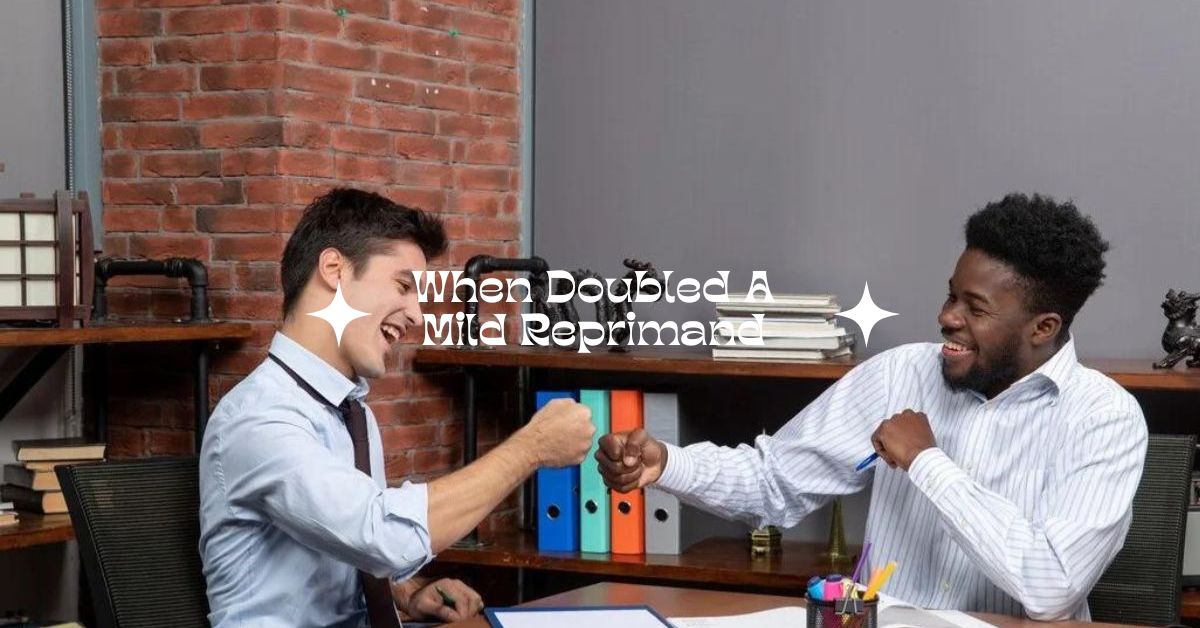When Doubled A Mild Reprimand – Tips For Effective Discipline!
I once got a warning from my boss for arriving late to work. When I repeated the same mistake a week later, I was given a more serious reprimand. It was a wake-up call for me to be more punctual and responsible.
Getting a mild reprimand can serve as a wake-up call to correct behavior. However, when the same mistake is repeated, a second reprimand may escalate the issue. This concept applies not just in work scenarios but also in child discipline, where doubling reprimands can sometimes have unintended consequences.
More learn the surprising consequences of When doubled a mild reprimand and repeated warnings.
When Doubled A Mild Reprimand Often Backfire?
1. Escalation of Conflict:
When doubled a mild reprimand can create a cycle of negativity. When children are constantly reprimanded, they may become defensive or resentful, leading to further conflicts.The focus shifts from the behavior to the punishment.
2. Loss of Respect:
Children may perceive repeated reprimands as unfair or excessive. This can erode their respect for authority figures and make them less likely to listen to their parents or teachers.When children feel they are being treated unfairly, they may become defiant or withdrawn.
3. Damaged Relationships:
When doubled a mild reprimand unsupported, or rejected, leading to resentment and distrust. Damaged relationships can have long-lasting consequences. These negative experiences can affect a child’s self-esteem, emotional well-being, and future relationships.
4. Ineffective Discipline:
When doubled a mild reprimand may not address the underlying cause of the behavior. If the root cause is not addressed, the behavior is likely to continue.Children may become desensitized to reprimands. Over time, repeated reprimands may lose their effectiveness, as children may no longer see them as a serious consequence.
5. Psychological Impact:
When doubled a mild reprimand children may experience negative emotions such as shame, guilt, or anger. These emotions can lead to behavioral problems, such as aggression, withdrawal, or anxiety.Constant reprimands can damage a child’s self-esteem.
It’s important to find alternative strategies for discipline when doubled a mild reprimand that are more effective and less harmful to the parent-child relationship. By understanding the potential consequences of doubled mild reprimands, parents can make informed choices about how to discipline their children.
What Role Does Positive Reinforcement Play In Child Discipline?
When Doubled a Mild Reprimand of Potential Consequences are
Positive reinforcement plays a crucial role in child discipline. It involves rewarding desired behaviors to increase the likelihood that they will be repeated. When children receive praise or other positive consequences for behaving well, they are more likely to repeat those behaviors in the future. This can be a more effective and positive approach to discipline than relying solely on punishment.
Positive reinforcement can help children develop self-esteem, motivation, and a sense of responsibility. It can also create a When doubled a mild reprimand more positive and supportive home environment, which can have a lasting impact on a child’s development.
What Are The Potential Consequences Of Repeatedly Reprimanding A Child?
Repeatedly reprimanding a child can have several negative consequences, including:
Escalation of conflict:
Constant reprimands can create a cycle of negativity, increasing conflict and making it harder to resolve issues.
Loss of respect:
Children may lose respect for authority figures if they feel they are being unfairly or excessively punished.
Damaged relationships:
Reprimands can strain the parent-child relationship, leading to resentment, distrust, and emotional distance.
Ineffective discipline:
Repeated reprimands may not address the underlying cause of the behavior, making them ineffective in changing it.
Psychological impact:
Children may experience negative emotions such as shame, guilt, or anger, which can lead to behavioral problems and damage their self-esteem.
It’s important to find alternative strategies for discipline that are more effective and less harmful to the parent-child relationship.
Is There A Specific Age When Doubled Reprimands Become Less Effective?
Yes, there is a general trend that doubled reprimands become less effective as children get older.
While younger children may be more responsive to simple, direct reprimands, older children may be more likely to become defiant or withdrawn in response to repeated reprimands.
As children enter the pre-teen and teenage years, they often crave autonomy and may resent repeated reprimands. It’s important to consider your child’s individual personality and developmental stage when determining the most effective disciplinary strategies.
Additionally, it’s important to remember that every child is different, and what works for one child may not work for another. It’s essential to tailor your disciplinary approach to your child’s individual needs and personality.
Is It Harmful To A Child’s Self-Esteem To Be Constantly Reprimanded?
Yes, constantly reprimanding a child can be harmful to their self-esteem. When children are constantly told they are wrong or bad, it can lead to feelings of shame, guilt, and inadequacy. These negative emotions can have a significant impact on a child’s self-esteem and overall well-being.
Instead of focusing on negative reinforcement, it’s important to focus on positive reinforcement and providing guidance and support. This can help children develop a sense of confidence and self-worth. When children feel loved, supported, and believed in, they are more likely to thrive and develop a positive self-image.
Additionally, it’s important to remember that children are still learning and growing. They may make mistakes along the way, and it’s important to approach these mistakes with patience and understanding. By focusing on positive reinforcement and providing guidance and support, parents can help their children develop a healthy sense of self-esteem and a positive outlook on life.
When Should Parents Consider Seeking Professional Help For Their Child’s Behavior Problems?
Parents should consider seeking professional help for their child’s behavior problems if they are concerned about their child’s emotional well-being or if they are struggling to manage their child’s behavior at home or school. Some signs that a child may need professional help include:
Persistent aggression or violence, Self-harm or suicidal thoughts, Excessive anxiety or fear, Withdrawal from social activities, Difficulty concentrating or focusing, Academic problems, Substance abuse, Eating disorders, Sleep problems.
If you are concerned about your child’s behavior, it is important to talk to your child’s doctor or a mental health professional. They can help you assess the situation and determine if your child would benefit from professional help.
How Can Parents Balance Discipline With Love And Support For Their Children?
Be consistent:
Apply rules and consequences consistently to avoid confusion and frustration. Children need to know what to expect, and When doubled a mild reprimand consistency helps them understand the boundaries.
Show love and affection:
Let your child know that you care about them, even when they misbehave. This helps children feel loved and supported, even when they make mistakes.
Avoid harsh punishments:
Focus on positive reinforcement and natural or logical consequences. Harsh punishments can damage a child’s self-esteem and create resentment.
Listen actively:
Pay attention to your child’s feelings and needs. This shows your child that you value their perspective and are willing to listen to them.
Set realistic expectations:
Consider your child’s age and developmental stage when setting rules. Avoid setting unrealistic expectations that can lead to frustration and disappointment.
By following these tips of When doubled a mild reprimand , parents can create a positive and supportive home environment that fosters healthy development and a strong parent-child relationship.
FAQs:
1. Is There A Specific Age When Doubled Reprimands Become Less Effective?
While there’s no definitive age, children in the pre-teen and teenage years often respond better to more independent and respectful approaches. When doubled a mild reprimand As children mature, they crave autonomy and may resent repeated reprimands, which can lead to defiance or withdrawal.
2. How Can Parents Avoid Becoming Overly Reactive When Their Child Misbehaves?
Count to ten or practice deep breathing to calm down.Remove yourself from the situation temporarily to cool down.When doubled a mild reprimand Try to understand the underlying reasons for the behavior. Try to see things from your child’s perspective.
3. What Are Some Common Mistakes Parents Make When Disciplining Their Children?
This can escalate the situation and damage the parent-child relationship.If you don’t follow through on your threats, your child may lose respect for you.This can damage your child’s self-esteem. Corporal punishment is ineffective and can be harmful.
4. What Is The Role Of Consistency In Effective Discipline?
Consistency is key to effective discipline When doubled a mild reprimand . Children need to understand the consequences of their actions and know that they will be applied consistently. This helps them learn and develop self-discipline.
5. What Are Some Alternative Strategies To Reprimands For Dealing With Children’s Misbehavior?
Allow your child to experience the natural consequences of their actions. Implement consequences that are related to the misbehavior.Provide a brief period of isolation for calm reflection. Reward good behavior to encourage desired behaviors.Discuss issues and concerns as a family.
Conclusion:
When doubled a mild reprimand can be a sign that a child or student is struggling to understand or follow expectations. It’s important to approach this situation calmly and try to understand the underlying reasons for the repeated behavior.
By understanding When doubled a mild reprimand the potential consequences of doubled mild reprimands and implementing effective discipline strategies, parents and teachers can create a positive and supportive environment for children to learn and grow.






